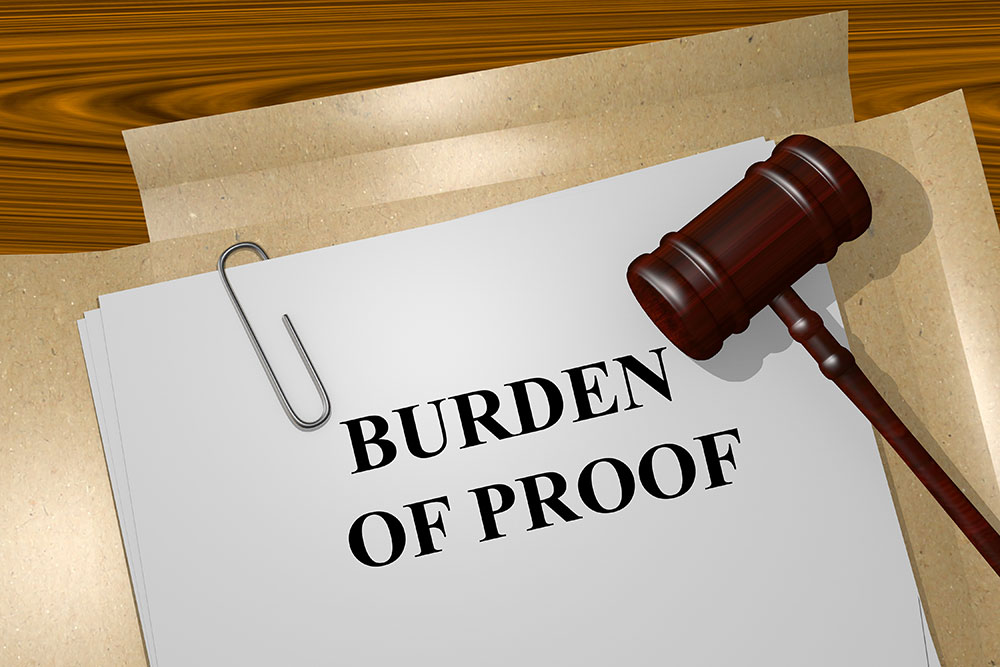When employee benefit claims brought under ERISA come before a court for resolution, who has the burden of proof? Does the claimant have the burden of proving the claim denial was improper or does the insurance company has the burden of proving its decision was correct? In most instances, the claimant has the burden of proof by a preponderance of the evidence that they are entitled to benefits.
Table of Contents
What is the Definition of a “Preponderance of the Evidence”?
The “preponderance of the evidence” is a legal term applied to the burden of proof in a civil action. ERISA claims are civil actions. Criminal cases are different and have a much higher standard of proof – beyond a reasonable doubt. A preponderance of the evidence means it is more likely than not that the evidence proves the case in favor of the claimant. Imagine a balancing scale – a preponderance of the evidence is enough evidence to tilt the scale to the claimant’s side.
What’s Different About ERISA Cases?
ERISA cases can sometimes involve what seems to be two burdens of proof. For claims that are decided under what is known as the de novo standard of proof, the claimant merely needs to provide sufficient evidence to establish an entitlement to the benefits sought. If the claim is adjudicated under the arbitrary and capricious/abuse of discretion standard, proving the insurer made the wrong decision is insufficient. The claimant also must show that the determination was without reasonable support, i.e., based on substantial evidence. The term “substantial evidence” has been given different meanings. Still, according to the Supreme Court, it means that there is evidence supporting the claim denial considering the entire record. Pointing to a single piece of evidence when the whole record supports a contrary conclusion is usually not enough. For example, a claimant for disability benefits has their claim supported by multiple doctors and test findings and has also been approved to receive Social Security disability benefits. In such a case, the burden of proof is likely met. It may not be overcome by a single conclusory opinion from a non-examining doctor who conducted a record review and did not examine the claimant.
When Does the Burden of Proof Shift to the Insurance Company?
If the denial is based on an exclusion in the policy, such as a pre-existing condition exclusion, the burden of proof is on the insurance company to establish the exclusion’s applicability. The claimant, however, still has the burden of proving their disability. If the policy contains a limitation, such as a provision that limits the payment of disability benefits to 24 months if the disability is due to a behavioral health condition, some courts, but not all, have ruled that the burden is on the insurance company to prove the applicability of the limitation. Moreover, if the claimant can meet the burden of proving they are disabled due to a physical condition that is independently disabling, the limitation is deemed inapplicable.
Another rule that is often applied to disputes over insurance coverage is known as contra proferentem. It means that if there is a term in the insurance policy that is ambiguous, the ambiguity will be construed in favor of the policyholder and against the insurance company. However, the rule of contra proferentem may not be applicable if the case is decided under the arbitrary and capricious standard of review.
Sticking to the subject of arbitrary and capricious review, another issue that might alter the proof considerations is the insurer’s conflict of interest. The Supreme Court has ruled that an insurance company that both decides a claim and is responsible for funding the benefit payments has a structural conflict of interest. Every dollar paid in benefits is a dollar less in earnings for the insurance company, which may unfairly influence the insurer to deny a claim out of financial self-interest. The Supreme Court ruled the conflict of interest must always be considered. However, it will be given more weight if the conflict has infected the decision and less weight if the insurance company can show it took steps to mitigate the conflict of interest.
A final issue that impacts the burden of proof is how courts look at cases where benefits were initially approved. Still, then the claim is closed without any apparent change in circumstances that justify the denial. While almost every court has held the claimant still has the burden of proving their entitlement to benefits, the court should look at the circumstances between the approval and termination of benefits to see whether the reversal was justified.
Practical Pointers
It should be clear from the discussion above that benefit claimants have their work cut out to meet their burden of proof in establishing their entitlement to benefits. It is rarely enough for a claimant to win an award of benefits based solely on a doctor’s conclusory statement that their patient is disabled or that the death of a loved one was accidental. Claimants need to provide a more detailed rationale and back it up with reports of clinical findings, test results, and other corroborative evidence that presents a convincing picture establishing that benefits are due. The Supreme Court rejected the notion that insurance companies must automatically give deference to reports from treating doctors, which means that claimants must provide evidence that backs up the treating doctors’ findings and opinions.
This also means that when a claimant receives a claim denial, they have to immediately start thinking about the possibility of going to court and meeting their burden of proof. Most claimants lack the knowledge and experience to address ERISA benefit claims’ legal, medical, and vocational issues. Thus, to meet their burden of proof, they should seek assistance from knowledgeable and experienced counsel with proven litigation success that shows they know how and can meet the burden of proof that claimants are required to present.







